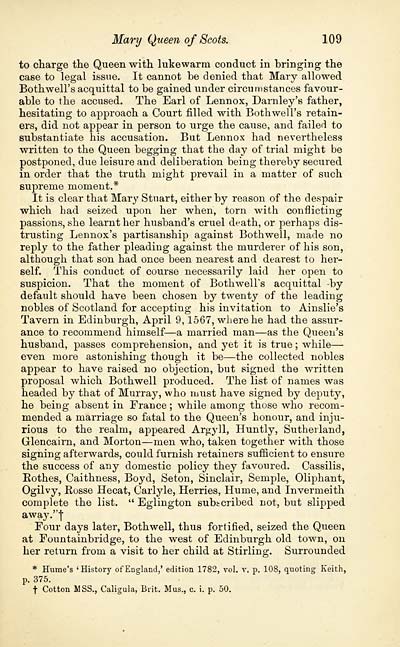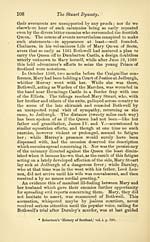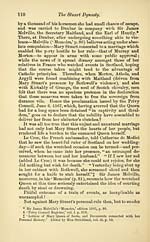Stuart dynasty
(129) Page 109
Download files
Complete book:
Individual page:
Thumbnail gallery: Grid view | List view

Mary Queen of Scots. 109
to charge the Queen with lukewarm conduct in bringing the
case to legal issue. It cannot be denied that Mary allowed
Bothwell's acquittal to be gained under circumstances favour-
able to the accused. The Earl of Lennox, Darnley's father,
hesitating to approach a Court filled with Bothwell's retain-
ers, did not appear in person to urge the cause, and failed to
substantiate his accusation. But Lennox had nevertheless
written to the Queen begging that the day of trial might be
postponed, due leisure and deliberation being thereby secured
in order that the truth might prevail in a matter of such
supreme moment.*
It is clear that Mary Stuart, either by reason of the despair
which had seized upon her when, torn with conflicting
passions, she learnt her husband's cruel death, or perhaps dis-
trusting Lennox's partisanship against Bothwell, made no
reply to the father pleading against the murderer of his son,
although that son had once been nearest and dearest to her-
self. This conduct of course necessarily laid her open to
suspicion. That the moment of Bothwell's acquittal by
default should have been chosen by twenty of the leading
nobles of Scotland for accepting his invitation to Ainslie's
Tavern in Edinburgh, April 9, 1567, where he had the assur-
ance to recommend himself — a married man — as the Queen's
husband, passes comprehension, and yet it is true; while —
even more astonishing though it be — the collected nobles
appear to have raised no objection, but signed the written
proposal which Bothwell produced. The list of names was
headed by that of Murray, who must have signed by deputy,
he being absent in France ; while among those who recom-
mended a marriage so fatal to the Queen's honour, and inju-
rious to the realm, appeared Argyll, Huntly, Sutherland,
Glencairn, and Morton — men who, taken together with those
signing afterwards, could furnish retainers sufficient to ensure
the success of any domestic policy they favoured. Cassilis,
Eothes, Caithness, Boyd, Seton, Sinclair, Semple, Oliphant,
Ogilvy, Rosse Hecat, Carlyle, Herries, Hume, and Invermeith
complete the list. " Eglington subscribed not, but slipped
away."j
Four days later, Bothwell, thus fortified, seized the Queen
at Fountainbridge, to the west of Edinburgh old town, on
her return from a visit to her child at Stirling. Surrounded
* Hume's 'History of England,' edition 1782, vol. v. p. 108, quoting Keith,
p. 375.
f Cotton MSS., Caligula, Brit. Mus., c. i. p. 50.
to charge the Queen with lukewarm conduct in bringing the
case to legal issue. It cannot be denied that Mary allowed
Bothwell's acquittal to be gained under circumstances favour-
able to the accused. The Earl of Lennox, Darnley's father,
hesitating to approach a Court filled with Bothwell's retain-
ers, did not appear in person to urge the cause, and failed to
substantiate his accusation. But Lennox had nevertheless
written to the Queen begging that the day of trial might be
postponed, due leisure and deliberation being thereby secured
in order that the truth might prevail in a matter of such
supreme moment.*
It is clear that Mary Stuart, either by reason of the despair
which had seized upon her when, torn with conflicting
passions, she learnt her husband's cruel death, or perhaps dis-
trusting Lennox's partisanship against Bothwell, made no
reply to the father pleading against the murderer of his son,
although that son had once been nearest and dearest to her-
self. This conduct of course necessarily laid her open to
suspicion. That the moment of Bothwell's acquittal by
default should have been chosen by twenty of the leading
nobles of Scotland for accepting his invitation to Ainslie's
Tavern in Edinburgh, April 9, 1567, where he had the assur-
ance to recommend himself — a married man — as the Queen's
husband, passes comprehension, and yet it is true; while —
even more astonishing though it be — the collected nobles
appear to have raised no objection, but signed the written
proposal which Bothwell produced. The list of names was
headed by that of Murray, who must have signed by deputy,
he being absent in France ; while among those who recom-
mended a marriage so fatal to the Queen's honour, and inju-
rious to the realm, appeared Argyll, Huntly, Sutherland,
Glencairn, and Morton — men who, taken together with those
signing afterwards, could furnish retainers sufficient to ensure
the success of any domestic policy they favoured. Cassilis,
Eothes, Caithness, Boyd, Seton, Sinclair, Semple, Oliphant,
Ogilvy, Rosse Hecat, Carlyle, Herries, Hume, and Invermeith
complete the list. " Eglington subscribed not, but slipped
away."j
Four days later, Bothwell, thus fortified, seized the Queen
at Fountainbridge, to the west of Edinburgh old town, on
her return from a visit to her child at Stirling. Surrounded
* Hume's 'History of England,' edition 1782, vol. v. p. 108, quoting Keith,
p. 375.
f Cotton MSS., Caligula, Brit. Mus., c. i. p. 50.
Set display mode to:
![]() Universal Viewer |
Universal Viewer | ![]() Mirador |
Large image | Transcription
Mirador |
Large image | Transcription
Images and transcriptions on this page, including medium image downloads, may be used under the Creative Commons Attribution 4.0 International Licence unless otherwise stated. ![]()
| Histories of Scottish families > Stuart dynasty > (129) Page 109 |
|---|
| Permanent URL | https://digital.nls.uk/94819314 |
|---|
| Description | A selection of almost 400 printed items relating to the history of Scottish families, mostly dating from the 19th and early 20th centuries. Includes memoirs, genealogies and clan histories, with a few produced by emigrant families. The earliest family history goes back to AD 916. |
|---|

